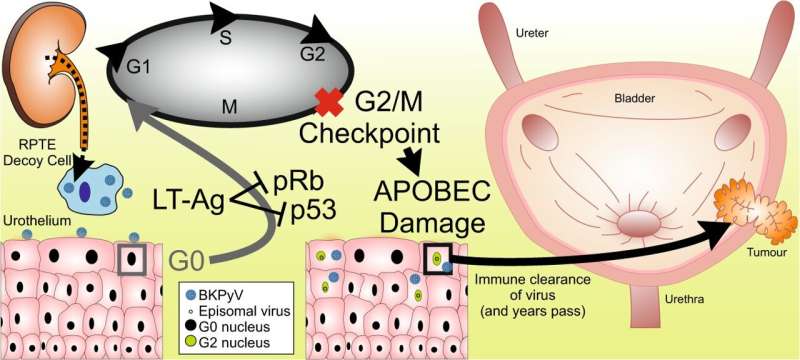Study: Common virus may cause bladder cancer

A common childhood viral infection causes damage to cells in the bladder which may lead to cancer, a new study has shown.
The study, led by researchers at the University of York and funded by the charity York Against Cancer, used laboratory grown human bladder cells to show that the virus—called BK—could be responsible for patterns of DNA damage seen in bladder tumors.
BK virus infects most people as children and causes cold-like symptoms. The virus can remain hidden in the kidneys and reactivate if the immune system is weakened by factors such as medical treatments or old age, the authors of the study say.
The research reveals how reactivation of BK triggers bladder cells to use specialist enzymes to destroy the virus. These anti-viral enzymes (called APOBECs) accidentally damage the DNA of the human bladder cells in ways that could lead to cancer.
New insight
The main risk factor for bladder cancer is smoking, however, when scientists have examined DNA from bladder tumors, they have not found the patterns of DNA damage they would expect from smoke carcinogens. The DNA of bladder tumors actually carries damage that has the signature pattern of APOBEC enzymes.
Lead author of the study, Dr. Simon Baker, from the Department of Biology at the University of York said: "Our findings alter our understanding of the causes of bladder cancer by showing that BK virus infections are a risk factor for bladder cancer because they force bladder cells to use APOBECs that damage their DNA."
Professor Jenny Southgate, Director of the Jack Birch Unit at the University of York, who was also involved in the research said: "This study brings important new insight to understanding the causes of bladder cancer."
Causal link
There are around 10,000 new cases of bladder cancer in the UK each year, with kidney transplant patients disproportionately affected by the disease. Estimates vary, but they are more than twice as likely to get bladder cancer than the general population, with one study suggesting they might be as much as 25 times more likely.
Dr. Simon Baker has now been awarded a Kidney Research UK fellowship to study BK infections in transplant patients and assess the causal link between the BK virus and bladder cancer.
Dr. Baker added: "This fellowship paves the way for our discoveries in the lab to be applied for the benefit of patients, and the next step for our research is to study infections in renal transplant patients, as they are at a particularly high risk of developing bladder cancers.
"This research is critically needed to improve our understanding of why people who are immunosuppressed, such as transplant patients, get more bladder cancers. Our research should not only help improve the care we give to these patients, but it may also have much wider implications for preventing bladder cancer in the future."
"We are also calling for consideration to be given to the development of a BK vaccine, much like the HPV vaccine which has successfully reduced rates of cervical cancer."
"Induction of APOBEC3-mediated genomic damage in urothelium implicates 2 BK polyomavirus (BKPyV) as a hit-and-run driver for bladder cancer" is published in the journal Oncogene.
More information: Simon C. Baker et al, Induction of APOBEC3-mediated genomic damage in urothelium implicates BK polyomavirus (BKPyV) as a hit-and-run driver for bladder cancer, Oncogene (2022). DOI: 10.1038/s41388-022-02235-8

















